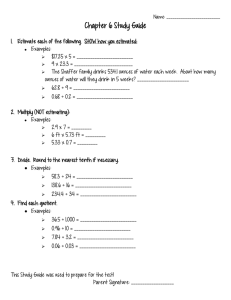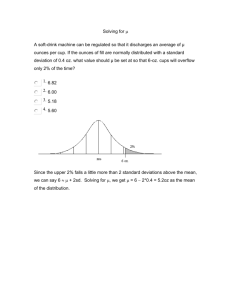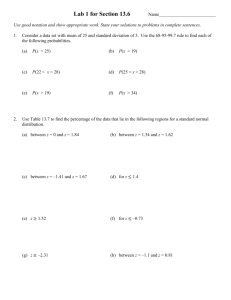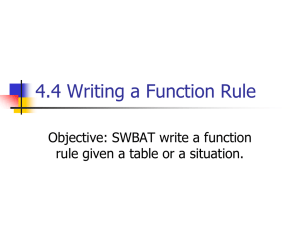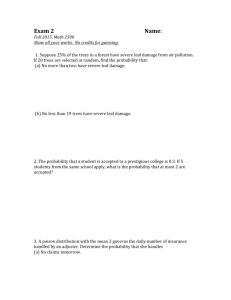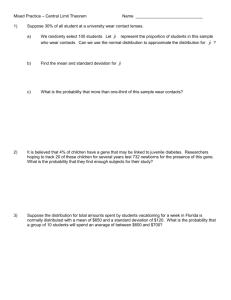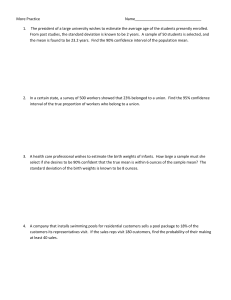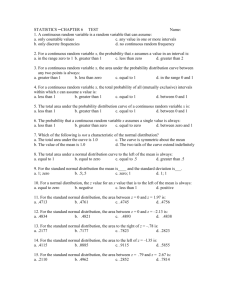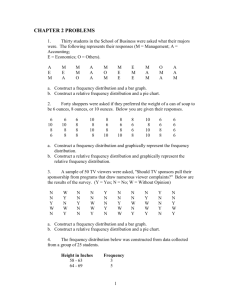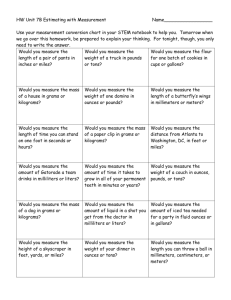Chapter 2: The Normal Distributions
advertisement
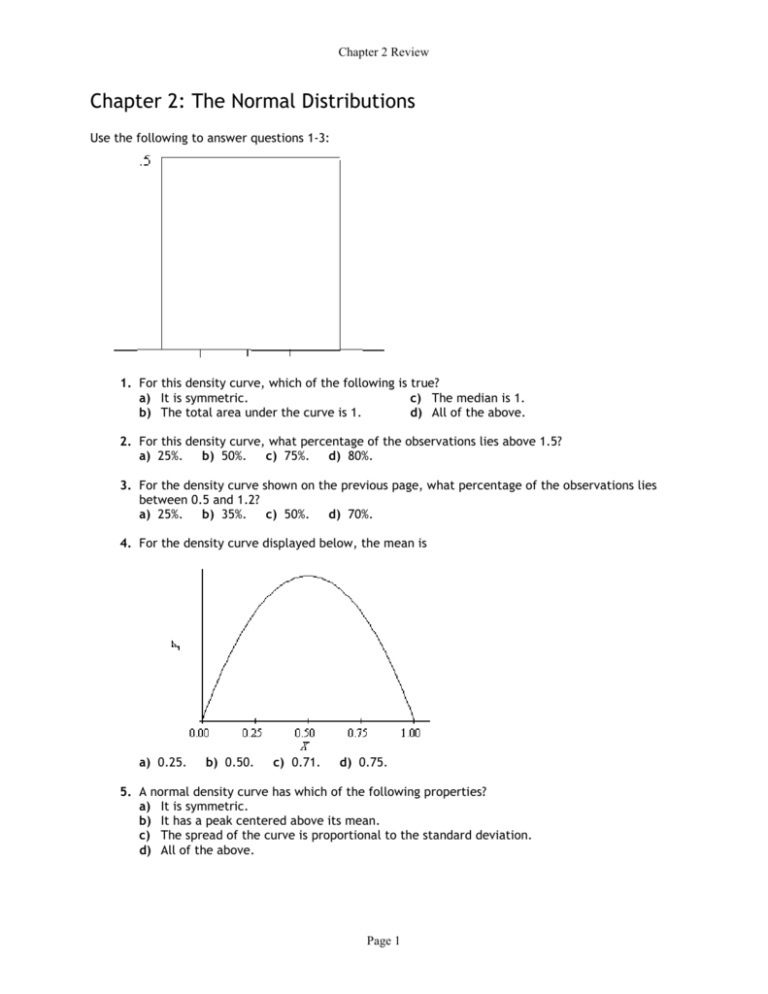
Chapter 2 Review Chapter 2: The Normal Distributions Use the following to answer questions 1-3: 1. For this density curve, which of the following is true? a) It is symmetric. c) The median is 1. b) The total area under the curve is 1. d) All of the above. 2. For this density curve, what percentage of the observations lies above 1.5? a) 25%. b) 50%. c) 75%. d) 80%. 3. For the density curve shown on the previous page, what percentage of the observations lies between 0.5 and 1.2? a) 25%. b) 35%. c) 50%. d) 70%. 4. For the density curve displayed below, the mean is a) 0.25. b) 0.50. c) 0.71. d) 0.75. 5. A normal density curve has which of the following properties? a) It is symmetric. b) It has a peak centered above its mean. c) The spread of the curve is proportional to the standard deviation. d) All of the above. Page 1 Chapter 2 Review 6. Items produced by a manufacturing process are supposed to weigh 90 grams. The manufacturing process is such, however, that there is variability in the items produced and they do not all weigh exactly 90 grams. The distribution of weights can be approximated by a normal distribution with mean 90 grams and a standard deviation of 1 gram. Using the 68–95– 99.7 rule, what percentage of the items will either weigh less than 87 grams or more than 93 grams? a) 6%. b) 94%. c) 99.7%. d) 0.3%. 7. For the density curve below, which of the following is true? a) b) c) d) The The The The mean mean mean mean and median are equal. is greater than the median. is less than the median. could be either greater than or less than the median. 8. The time to complete a standardized exam is approximately normal with a mean of 70 minutes and a standard deviation of 10 minutes. Using the 68–95–99.7 rule, what percentage of students will complete the exam in under an hour? a) 68%. b) 32%. c) 16%. d) 5%. 9. Using the standard normal distribution tables, what is the area under the standard normal curve corresponding to Z < 1.1? a) 0.1357. b) 0.2704. c) 0.8413. d) 0.8643. 10. Using the standard normal distribution tables, what is the area under the standard normal curve corresponding to Z > –1.22? a) 0.1151. b) 0.1112. c) 0.8849. d) 0.8888. 11. Using the standard normal distribution tables, what is the area under the standard normal curve corresponding to –0.5 < Z < 1.2? a) 0.3085. b) 0.8849. c) 0.5764. d) 0.2815. Use the following to answer questions 12-13: The temperature at any random location in a kiln used in the manufacture of bricks is normally distributed with a mean of 1000 and a standard deviation of 50° F. 12. If bricks are fired at a temperature above 1125°F, they will crack and must be discarded. If the bricks are placed randomly throughout the kiln, the proportion of bricks that crack during the firing process is closest to a) 49.38%. b) 2.28%. c) 47.72%. d) 0.62%. Page 2 Chapter 2 Review 13. When glazed bricks are put in the oven, if the temperature is below 900°F they will miscolor. If the bricks are placed randomly throughout the kiln, the proportion of glazed bricks that miscolor is closest to a) 49.38%. b) 2.28%. c) 47.72%. d) 0.62%. 14. Birthweights at a local hospital have a normal distribution with a mean of 110 ounces and a standard deviation of 15 ounces. The proportion of infants with birthweights under 95 ounces is a) 0.500. b) 0.159. c) 0.341. d) 0.841. 15. A company produces packets of soap powder labeled “Giant Size 32 Ounces.” The actual weight of soap powder in a box has a normal distribution with a mean of 33 ounces and a standard deviation of 0.7 ounces. What proportion of packets is underweight (i.e., weighs less than 32 ounces)? a) .0764. b) .2420. c) .7580. d) .9236. 16. A market research company employs a large number of typists to enter data into a computer. The time taken for new typists to learn the computer system is known to have a normal distribution with a mean of 90 minutes and a standard deviation of 18 minutes. The proportion of new typists that take more than two hours to learn the computer system is a) 0.952. b) 0.548. c) 0.048. d) 0.452. Use the following to answer questions 17-18: The distribution of actual weights of 8.0-ounce chocolate bars produced by a certain machine is normal with a mean of 8.1 ounces and a standard deviation of 0.1 ounces. 17. The proportion of chocolate bars weighing less than 8.0 ounces is a) 0.500. b) 0.159. c) 0.341. d) 0.841. 18. The proportion of chocolate bars weighing between 8.2 and 8.3 ounces is a) 0.819. b) 0.636. c) 0.477. d) 0.136. 19. Birthweights at a local hospital have a normal distribution with a mean of 110 ounces and a standard deviation of 15 ounces. The proportion of infants with birthweights between 125 ounces and 140 ounces is a) 0.819. b) 0.636. c) 0.477. d) 0.136. 20. The scores on a university examination are normally distributed with a mean of 62 and a standard deviation of 11. If the bottom 5% of students will fail the course, what is the lowest mark that a student can have and still be awarded a passing grade? a) 62. b) 57. c) 44. d) 40. 21. The time to complete a standardized exam is approximately normal with a mean of 70 minutes and a standard deviation of 10 minutes. How much time should be given to complete the exam so that 80% of the students will complete the exam in the time given? a) 84 minutes. b) 78.4 minutes. c) 92.8 minutes. d) 79.8 minutes. 22. The time taken to prepare the envelopes to mail a weekly report to all executives in a company has a normal distribution with a mean of 35 minutes and a standard deviation of 2 minutes. On 95% of occasions the mailing preparation takes less than a) 38.29 minutes. b) 31.71 minutes. c) 35.25 minutes. d) 34.75 minutes. Page 3 Chapter 2 Review 23. A soft-drink machine can be regulated so that it discharges an average of ounces per cup. If the ounces of fill are normally distributed with a standard deviation of 0.4 ounces, what value should be set at so that 6-ounce cups will overflow only 2% of the time? a) 6.82. b) 6.00. c) 5.18. d) 5.60. 24. The weights of packets of cookies produced by a certain manufacturer have a normal distribution with a mean of 202 grams and a standard deviation of 3 grams. The weight that should be stamped on the packet so that only 1% of packets are underweight is a) 209 grams. b) 195 grams. c) 202 grams. d) Not enough information to tell. 25. The weight of a randomly selected can of a new soft drink is known to have a normal distribution with a mean of 8.3 ounces and a standard deviation of 0.2 ounces. The weight that should be stamped on the can so that only 2% of cans are underweight is a) 7.89 ounces. b) 8.71 ounces. c) 8.26 ounces. d) 8.28 ounces. 26. A company produces packets of soap powder labeled “Giant Size 32 Ounces.” The actual weight of soap powder in a box has a normal distribution with a mean of 33 ounces and a standard deviation of 0.7 ounces. Ninety-five percent of packets actually contain more than x ounces of soap powder. What is x? a) 34.40. b) 34.15. c) 31.85. d) 31.60. 27. The distribution of actual weights of 8-ounce chocolate bars produced by a certain machine is normal with a mean of 8.1 ounces and a standard deviation of 0.1 ounces. What weight should be put on the chocolate bar wrappers so that only 1% of bars are underweight? a) 7.77 ounces. b) 8.33 ounces. c) 7.87 ounces. d) 8.23 ounces. 28. A stemplot of a set of data is roughly symmetric, but the data do not even approximately follow the 68–95–99.7 rule. We conclude that the data are a) normal, but they are not standard normal. b) standard normal. c) not normal. d) normal. Page 4 Chapter 2 Review 29. Which of the following four histograms would best be approximated by a normal distribution? a) b) c) d) Page 5 Chapter 2 Review 30. The scores of a reference population on the Wechsler Intelligence Scale for Children (WISC) are normally distributed with µ = 100 and = 15. a. What score would represent the 50th percentile? Explain. b. Approximately what percent of the scores fall in the range from 70 to 130? c. A score in what range would represent the top 16% of the scores? 31. The distribution of heart disease death rates, per 100,000 people, in 19 developed Western countries is close to this normal distribution. a. From this normal curve, the mean heart disease death rate per 100,000 people takes approximately what value? b. The standard deviation of the heart disease rate per 100,000 people is approximately what value? 32. Using Table A (table of standard normal probabilities) or your calculator, find the proportion of observations from a standard normal distribution that satisfies each of the following statements. In each case, sketch the normal curve and shade the area under the curve that is the answer to the question. a. Z < –1.5 b. 1.5 < Z < 0.8 Page 6 Chapter 2 Review 33. In a study of elite distance runners, the mean weight was reported to be 63.1 kilograms (kg), with a standard deviation of 4.8 kg. Assuming that the distribution of weights is normal, sketch the density curve of the weight distribution, with the horizontal axis marked in kilograms. 34. Jill scores 680 on the mathematics part of the SAT. The distribution of SAT scores in a reference population is normally distributed with mean 500 and standard deviation 100. Jack takes the ACT mathematics test and scores 27. ACT scores are normally distributed with mean 18 and standard deviation 6. a. Find the standardized scores for both students. b. Assuming that both tests measure the same kind of ability, who has the higher score, and why? 35. I’m thinking about a density curve that consists of a straight line segment from the point (0, 2/3) to the point (1, 4/3) in the x–y plane. a. Sketch this density curve. b. What percent of the observations lie below 1/2? c. What percent of the observations lie below 1? d. What percent of the observations lie between 1/2 and 1? Page 7 Chapter 2 Review Answer Key 1. d 2. a 3. b 4. b 5. d 6. d 7. c 8. c 9. d 10. d 11. 12. 13. 14. 15. 16. 17. 18. 19. 20. c d b b a c b d d c 21. 22. 23. 24. 25. 26. 27. 28. 29. b a c b a c c c c Page 8
